 The Kodi team, operating under the XBMC Foundation, announced last week that a third-party had registered the Kodi trademark in Canada and was using it for their own purposes.
The Kodi team, operating under the XBMC Foundation, announced last week that a third-party had registered the Kodi trademark in Canada and was using it for their own purposes.
That person was Geoff Gavora, who had previously been in communication with the Kodi team, expressing how important the software was to his sales.
“We had hoped, given the positive nature of his past emails, that perhaps he was doing this for the benefit of the Foundation. We learned, unfortunately, that this was not the case,” XBMC Foundation President Nathan Betzen said.
According to the Kodi team, Gavora began delisting Amazon ads placed by companies selling Kodi-enabled products, based on infringement of Gavora’s trademark rights.
“[O]nly Gavora’s hardware can be sold, unless those companies pay him a fee to stay on the store,” Betzen explained.
Predictably, Gavora’s move is being viewed as highly controversial, not least since he’s effectively claiming licensing rights in Canada over what should be a free and open source piece of software. TF obtained one of the notices Amazon sent to a seller of a Kodi-enabled device in Canada, following a complaint from Gavora.
Take down Kodi from Amazon, or pay Gavora
So who is Geoff Gavora and what makes him tick? Thanks to a 2016 interview with Ali Salman of the Rapid Growth Podcast, we have a lot of information from the horse’s mouth.
It all began in 2011, when Gavora began jailbreaking Apple TVs, loading them with XBMC, and selling them to friends.
“I did it as a joke, for beer money from my friends,” Gavora told Salman.
“I’d do it for $25 to $50 and word of mouth spread that I was doing this so we could load on this media center to watch content and online streams from it.”
Intro to the interview with Ali Salman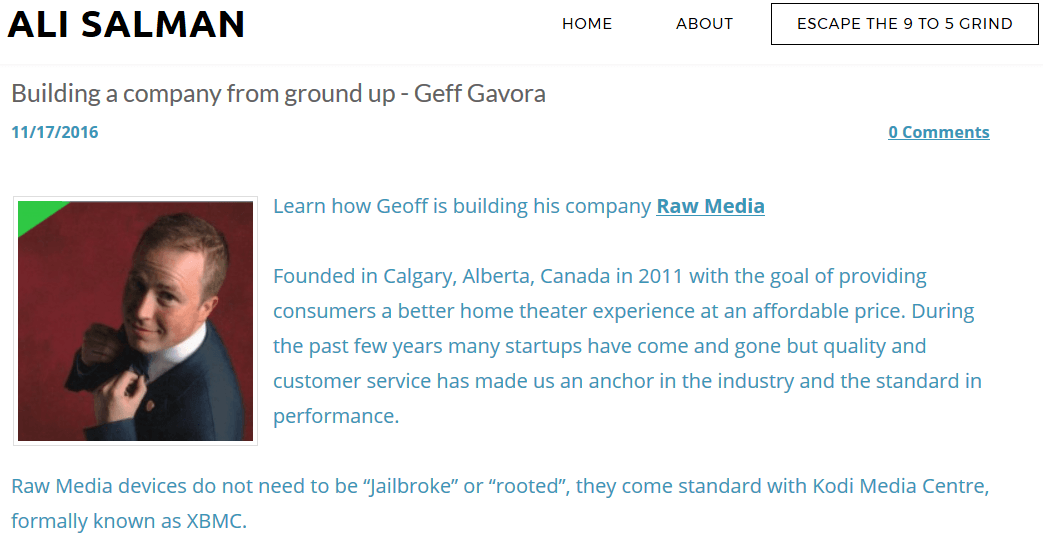
Soon, however, word of mouth caused the business to grow wings, Gavora claims.
“So they started telling people and I start telling people it’s $50, and then I got so busy so I start telling people it’s $75. I’m getting too busy with my work and with this. And it got to the point where I was making more jailbreaking these Apple TVs than I was at my career, and I wasn’t very happy at my career at that time.”
Jailbreaking was supposed to be a side thing to tide Gavora over until another job came along, but he had a problem – he didn’t come from a technical background. Nevertheless, what Gavora did have was a background in marketing and with a decent knowledge of how to succeed in customer service, he majored on that front.
Gavora had come to learn that while people wanted his devices, they weren’t very good at operating XBMC (Kodi’s former name) which he’d loaded onto them. With this in mind, he began offering web support and phone support via a toll-free line.
“I started receiving calls from New York, Dallas, and then Australia, Hong Kong. Everyone around the world was calling me and saying ‘we hear there’s some kid in Calgary, some young child, who’s offering tech support for the Apple TV’,” Gavora said.
But with things apparently going well, a wrench was soon thrown into the works when Apple released the third variant of its Apple TV and Gavorra was unable to jailbreak it. This prompted him to market his own Linux-based set-top device and his business, Raw-Media, grew from there.
While it seems likely that so-called ‘Raw Boxes’ were doing reasonably well with consumers, what was the secret of their success? Podcast host Salman asked Gavora for his ‘networking party 10-second pitch’, and the Canadian was happy to oblige.
“I get this all the time actually. I basically tell people that I sell a box that gives them free TV and movies,” he said.
This was met with laughter from the host, to which Gavora added, “That’s sort of the three-second pitch and everyone’s like ‘Oh, tell me more’.”
“Who doesn’t like free TV, come on?” Salman responded. “Yeah exactly,” Gavora said.
The image below, taken from a January 2016 YouTube unboxing video, shows one of the products sold by Gavora’s company.
Raw-Media Kodi Box packaging (note Kodi logo)
Bearing in mind the offer of free movies and TV, the tagline on the box, “Stop paying for things you don’t want to watch, watch more free tv!” initially looks quite provocative. That being said, both the device and Kodi are perfectly capable of playing plenty of legal content from free sources, so there’s no problem there.
What is surprising, however, is that the unboxing video shows the device being booted up, apparently already loaded with infamous third-party Kodi addons including PrimeWire, Genesis, Icefilms, and Navi-X.
The unboxing video showing the Kodi setup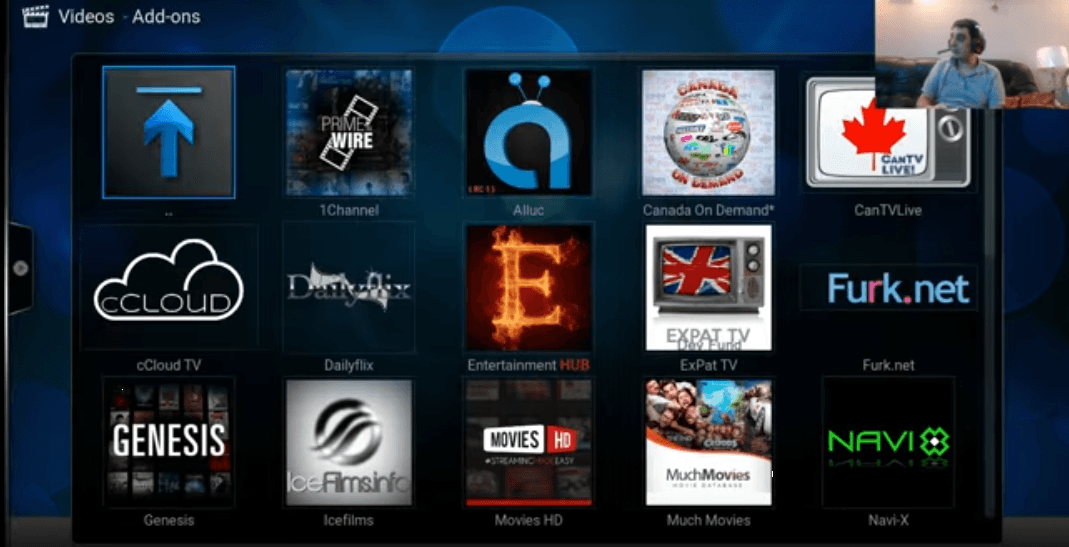
Given that Gavora has registered the Kodi trademark in Canada and prints the official logo on his packaging, this runs counter to the official Kodi team’s aggressive stance towards boxes ready-configured with what they categorize as banned addons. Matters are compounded when one visits the product support site.
As seen in the image below, Raw-Media devices are delivered with a printed card in the packaging informing people where to get the after-sales services Gavora says he built his business upon. The cards advise people to visit No-Issue.ca, a site setup to offer text and video-based support to set-top box buyers.
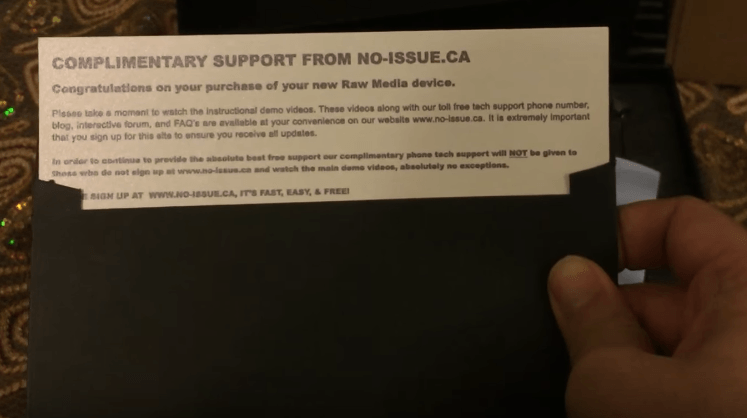
No-Issue.ca (which is hosted on the same server as raw-media.ca and claimed officially as a sister site here) now redirects to No-Issue.is, as per a 2016 announcement. It has a fairly bland forum but the connected tutorial videos, found on No Issue’s YouTube channel, offer a lot more spice.
Registered under Gavora’s online nickname Gombeek (which is also used on the official Kodi forums), the channel is full of videos detailing how to install and use a wide range of addons.
The No-issue YouTube Channel tutorials
But while supplying tutorial videos is one thing, providing the actual software addons is another. Surprisingly, No-Issue does that too. Filed away under the URL http://solved.no-issue.is/ is a Kodi repository which distributes a wide range of addons, including many that specialize in infringing content, according to the Kodi team.
The No-Issue repository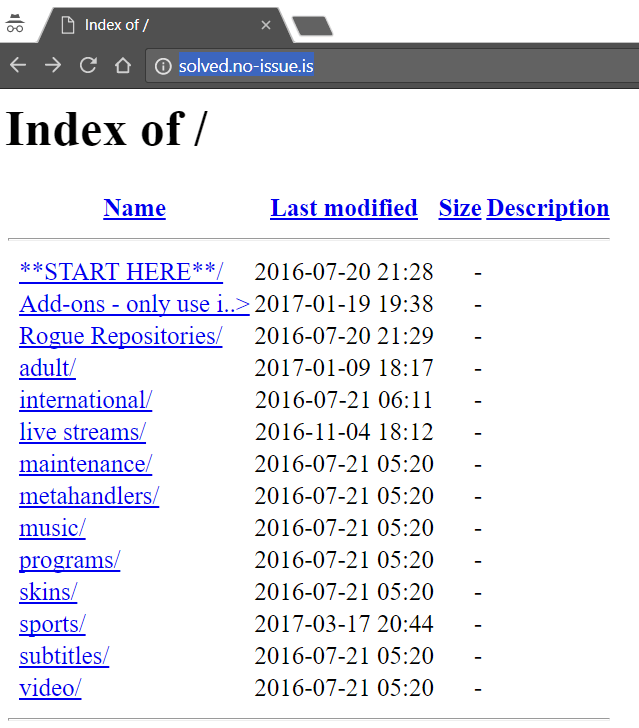
A source familiar with Raw-Media’s devices informs TF that they’re no longer delivered with addons installed. However, tools hosted on No-Issue.is automate the installation process for the customer, with unlisted YouTube Videos (1,2) providing the instructions.
XBMC Foundation President Nathan Betzen says that situation isn’t ideal.
“If that really is his repo it is disappointing to see that Gavora is charging a fee or outright preventing the sale of boxes with Kodi installed that do not include infringing add-ons, while at the same time he is distributing boxes himself that do include the infringing add-ons like this,” Betzen told TF.
While the legality of this type of service is yet to be properly tested in Canada and may yet emerge as entirely permissible under local law, Gavora himself previously described his business as operating in a gray area.
“If I could go back in time four years, I would’ve been more aggressive in the beginning because there was a lot of uncertainty being in a gray market business about how far I could push it,” he said.
“I really shouldn’t say it’s a gray market because everything I do is completely above board, I just felt it was more gray market so I was a bit scared,” he added.
But, legality aside (which will be determined in due course through various cases 1,2), the situation is still problematic when it comes to the Kodi trademark.
The official Kodi team indicate they don’t want to be associated with any kind of questionable addon or even tutorials for the same. Nevertheless, several of the addons installed by No-Issue (including PrimeWire, cCloud TV, Genesis, Icefilms, MoviesHD, MuchMovies and Navi-X, to name a few), are present on the Kodi team’s official ban list.
The fact remains, however, that Gavora successfully registered the trademark in Canada (one month later it was transferred to a brand new company at the same address), and Kodi now have no control over the situation in the country, short of a settlement or some kind of legal action.
Kodi matters aside, though, we get more insight into Gavora’s attitudes towards intellectual property after learning that he studied gemology and jewelry at school. He’s a long-standing member of jewelry discussion forum Ganoskin.com (his profile links to Gavora.com, a domain Gavora owns, as per information supplied by Amazon).
Things get particularly topical in a 2006 thread titled “When your work gets ripped“. The original poster asked how people feel when their jewelry work gets copied and Gavora made his opinions known.
“I think that what most people forget to remember is that when a piece from Tiffany’s or Cartier is ripped off or copied they don’t usually just copy the work, they will stamp it with their name as well,” Gavora said.
“This is, in fact, fraud and they are deceiving clients into believing they are purchasing genuine Tiffany’s or Cartier pieces. The client is in fact more interested in purchasing from an artist than they are the piece. Laying claim to designs (unless a symbol or name is involved) is outrageous.”
Unless that ‘design’ is called Kodi, of course, then it’s possible to claim it as your own through an administrative process and begin demanding licensing fees from the public. That being said, Gavora does seem to flip back and forth a little, later suggesting that being copied is sometimes ok.
“If someone copies your design and produces it under their own name, I think one should be honored and revel in the fact that your design is successful and has caused others to imitate it and grow from it,” he wrote.
“I look forward to the day I see one of my original designs copied, that is the day I will know my design is a success.”
From their public statements, this opinion isn’t shared by the Kodi team in respect of their product. Despite the Kodi name, software and logo being all their own work, they now find themselves having to claw back rights in Canada, in order to keep the product free in the region. For now, however, that seems like a difficult task.
TorrentFreak wrote to Gavora and asked him why he felt the need to register the Kodi trademark, but we received no response. That means we didn’t get the chance to ask him why he’s taking down Amazon listings for other people’s devices, or about something else that came up in the podcast.
“My biggest weakness, I guess, is that I’m too ethical about how I do my business,” he said, referring to how he deals with customers.
Only time will tell how that philosophy will affect Gavora’s attitudes to trademarks and people’s desire not to be charged for using free, open source software.
Source: TF, for the latest info on copyright, file-sharing, torrent sites and ANONYMOUS VPN services.

 This week we have three newcomers in our chart.
This week we have three newcomers in our chart. When we first heard of the idea to use
When we first heard of the idea to use 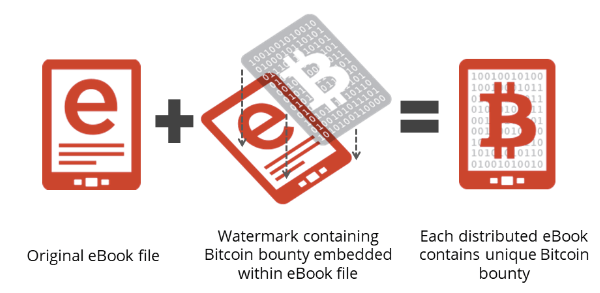








 Our coverage of Golden Eye International dates back more than five years. Much like similar companies in the copyright troll niche, the outfit monitors BitTorrent swarms, collects IP addresses, and then heads off to court to obtain alleged pirates’ identities.
Our coverage of Golden Eye International dates back more than five years. Much like similar companies in the copyright troll niche, the outfit monitors BitTorrent swarms, collects IP addresses, and then heads off to court to obtain alleged pirates’ identities. If you enjoy this episode, consider becoming a patron and getting involved with the show.
If you enjoy this episode, consider becoming a patron and getting involved with the show.